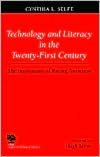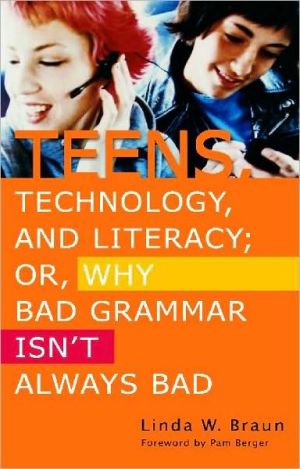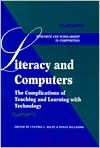Technology and Literacy in the Twenty-First Century: The Importance of Paying Attention
Part critique of existing policy and practice, part call-to-action, Technology and Literacy in the Twenty-First Century explores the complex linkage between technology and literacy that has come to characterize American culture and its public educational system at the end of the twentieth century.\ \ To provide a specific case study of this complex cultural formation, award-winning educator Cynthia L. Selfe discusses the Technology Literacy Challenge, an official, federally sponsored...
Search in google:
Part critique of existing policy and practice, part call-to-action, Technology and Literacy in the Twenty-First Century explores the complex linkage between technology and literacy that has come to characterize American culture and its public educational system at the end of the twentieth century. To provide a specific case study of this complex cultural formation, award-winning educator Cynthia L. Selfe discusses the Technology Literacy Challenge, an official, federally sponsored literacy project begun in 1996 that has changed—at fundamentally important levels—the definition of literacy and the practices recognized as constituting literate behavior in America. Selfe tries to identify the effects of this new literacy agenda, focusing specifically on what she calls "serious and shameful" inequities it fosters in our culture and in the public education system: among them, the continuing presence of racism, poverty, and illiteracy. She describes how the national project to expand technological literacy came about, what effects it has yielded, why the American public has supported this project, and how teachers of English, language arts, and composition have contributed to this project, despite their best intentions. A primary goal of this study is to make teachers of English and composition increasingly aware of the new literacy agenda and to suggest how they might positively influence its shape and future direction, both in the classroom and in the community. This awareness is an integral part of educators' larger professional responsibility to understand the way in which our culturethinks about and values literacy. Perhaps even more important, argues Selfe, this awareness is part of teachers' ethical responsibility to understand how literacy and literacy instruction directly and continually affect the lived experiences of the individuals and families with whom teachers interact.
Foreword: In the Best Modern WayIntroduction: Paying Attention to the Technology-Literacy LinkagePt. 1A New Literacy Agenda and Its Challenges1Literacy and Technology Linked: The National Project to Expand Technological Literacy32The Problem of Polemic: Representations of Technological Literacy in the Popular Press25Pt. 2An Analysis of Social Investment in the New Literacy Agenda3The Role of Government434The Role of Education645The Role of Business and Industry866The Role of Parents987The Role of Ideology114Pt. 3The Future and Our Responsibility: Sites and Plans for Action and Change8Paying Attention to Technology, Learning about Literacy1339Working for Change146Works Cited165Index177


